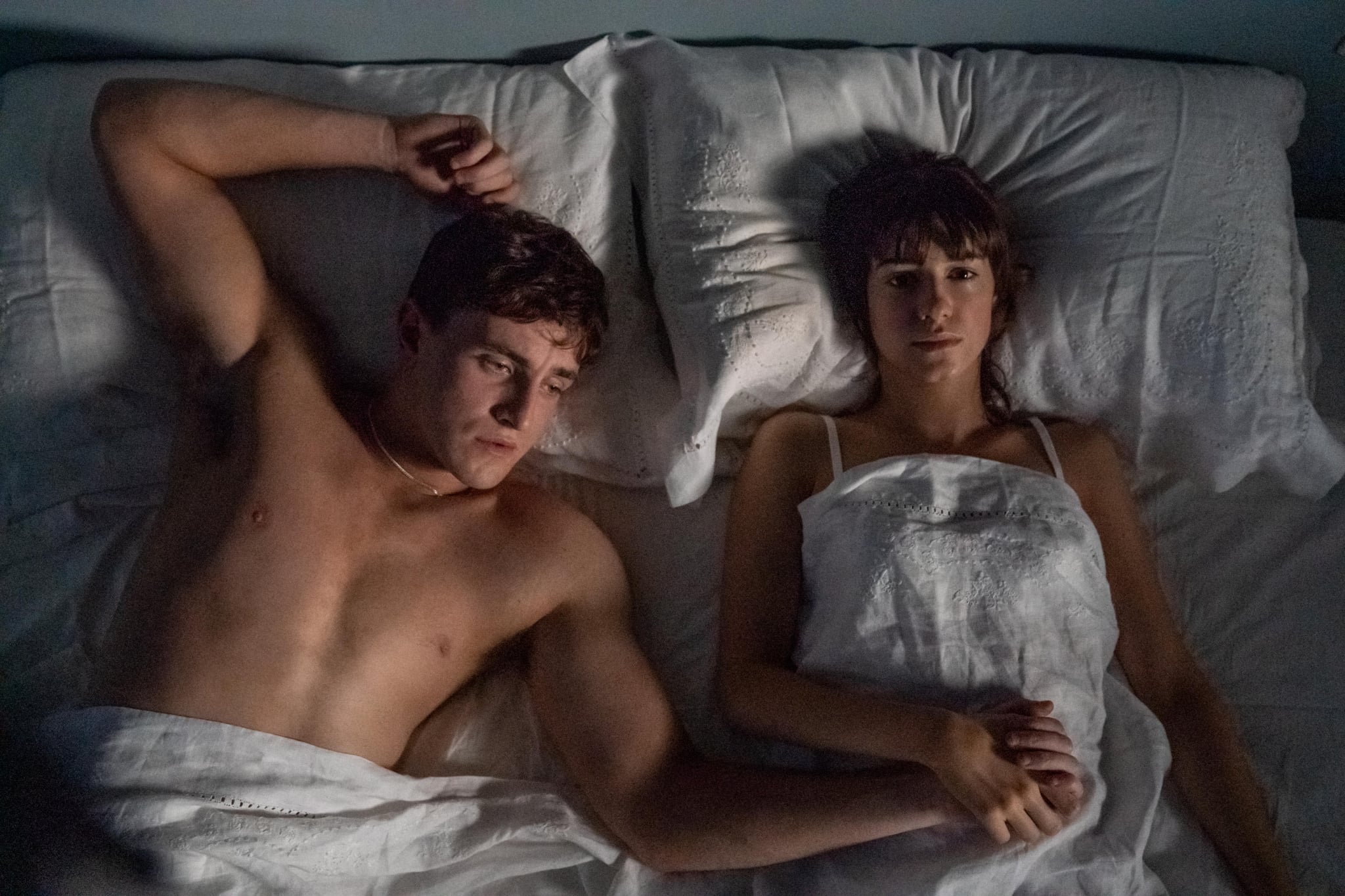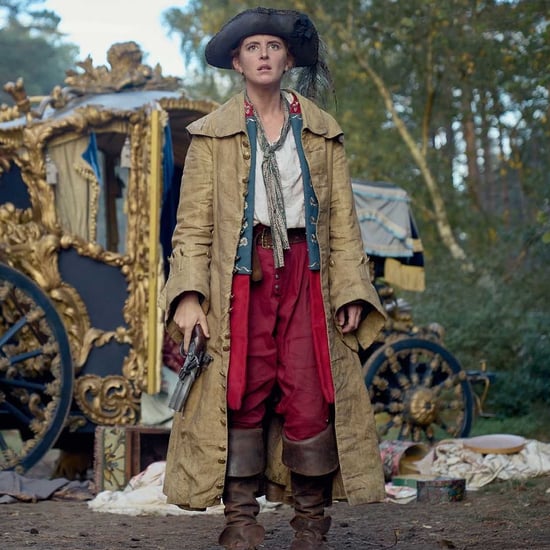Interview With Ita O’Brien, Film and TV Intimacy Coordinator
From Sex Education to Normal People, Ita O'Brien Choreographs Some of TV's Best Sex Scenes

Editor's Note: The following story discusses depictions of domestic and sexual abuse in film and could be triggering for some people.
The UK has produced two standout TV series in recent months: Sex Education (Netflix) and Normal People (BBC). Both follow a cast of teenagers as they navigate the many ups and downs of adulthood, and you would think that's where the similarities end. While Sex Education uses tongue-in-cheek humour to tackle heavier issues like sexuality and gender binaries, Normal People depicts first love and mental health in a quieter way, where the power is felt fully in long stares and things left unsaid. But when I sat down to watch Normal People, the intimate sex scenes reminded me of Sex Education a lot, even though they are worlds apart in terms of their tone and pace.
Both shows deliver raw and honest depictions of sex across a spectrum of sexualities and desires, so naturally, it was a hot topic at the round-table interviews I attended for both series. When questioned about what it was like to film the huge number of sex scenes, there's one person that both shows' cast and crew credit for the believability: Ita O'Brien. An intimacy coordinator with a background in dancing, acting, and movement coaching, O'Brien has developed a set of guidelines to protect actors while filming sex scenes, and to ensure that networks are producing great intimate content. In both cases, the young actors said filming scenes under O'Brien's guidance was empowering — after a long day of filming, they felt confident and like they'd completed an honest day's work, despite the vulnerable positions the scenes put them in.

Image Source: BBC / Element Pictures / Hulu
On the day that O'Brien and I caught up (in our respective homes during the UK's novel coronavirus (COVID-19) lockdown), it was the day before her daughter's birthday. She started the interview by telling me all about the cake she planned to bake that evening, and what began as a scheduled 20-minute conversation evolved into almost two hours of chatting. Pretty quickly, it was obvious why O'Brien has been so successful in her business, pairing her extensive experience in the creative arts with her warm and empathetic personality. She is my favourite kind of person: a ballsy woman who's tough but undoubtedly kind. We spoke at length about the film industry and how it has historically approached intimate content, how it's evolved since the birth of Time's Up in early 2018, and exactly what it means to be an intimacy coordinator on set.
"A production wouldn't dream of filming any degree of stunt or fight without a stunt coordinator . . . It should be exactly the same with intimate content."
At the centre of O'Brien's work are the Intimacy on Set guidelines, which she designed in 2017 to create clear consent practices and boundaries for actors while filming sex scenes. At the time, she was working as a movement director in the theatre industry but was inspired to become an intimacy coordinator after working with Vanessa Ewan (author of Actor Movement: Expression of the Physical Being). "I contacted Equity (the UK trade union for creative practitioners) and I asked, 'What have you got that speaks to the actors?' They gave me their contracts, which are, of course, very robust for legal terms," she said. "But they don't really speak to or serve the actor — that's when I started putting together the intimacy guidelines."
After a series of conversations with Equity, a meeting never came to fruition — then the Harvey Weinstein story broke. In October 2017, the New York Times published a now-famous article titled "Harvey Weinstein Paid Off Sexual Harassment Accusers For Decades," which was followed shortly by Ronan Farrow's article in the New Yorker, in which multiple women made allegations of sexual misconduct against the American former film producer.
Soon after, Equity got back in touch with O'Brien and asked her to come in and present her guidelines. "The Women in Film and Television instantly endorsed them and the work has gone from there," she said. "Sex Education was the first program that employed me as an intimacy coordinator, then Gentleman Jack . . . and Watchmen in September 2018." And business has been booming ever since. O'Brien worked on over 20 productions in 2019 alone and currently has 36 intimacy coordinators spread around the world, all of whom have moved through the training program she developed through her company, Intimacy on Set.

O'Brien believes that sex scenes are an integral part of the storytelling process, but while the scenes themselves are innately personal and, well, intimate, the line between an actor's personal life and a character's story should never be blurred. Her guidelines ensure actors' safety, first and foremost, but this method also simply produces powerful (and believable) sex scenes, as evidenced in Normal People, which depicts sex and consent in a way I'd never seen on TV before. "It should all be clearly choreographed down to the last detail, so that you can then bring all of your skills as an actor to that moment, and to that character," she said. This level of planning means actors aren't relying on dipping into deeply personal experiences to produce great content, so they won't be at risk of giving too much of themselves to the scene. "Talking about the risk — the risk is not just physical, but emotional and psychological," she said. "When it's not done well, [for example] when someone ends up having a butt grabbed in the throws of the scene," it can be very damaging.
One show O'Brien was shocked to hear was produced without a fight director or an intimacy coordinator on set was HBO's 2017 drama Big Little Lies. In particular, the violent scenes between Nicole Kidman and Alexander Skarsgard's characters, which include shocking depictions of domestic and sexual abuse. Both Kidman and Skarsgard have spoken publicly about the negative physical and psychological impacts it had on them to shoot these scenes method (meaning the actors aspire to completely identify emotionally with a part). Kidman even admitted in an interview with The Hollywood Reporter that she felt disturbed after filming the scenes.
O'Brien believes that sex scenes are an integral part of storytelling, but while they're innately personal, the line between an actor's personal life and a character's story should never be blurred.
But in interviews following the release of Big Little Lies first season, Kidman also spoke about the experience as, overall, a positive one, and felt that director Jean-Marc Vallée's method to "let it play out and [allow] things [to] happen that are very surprising" was crucial to the authenticity of their characters' stories. O'Brien feels differently — very differently. O'Brien's guidelines approach all intimate content in the same way as a fight or dance sequence. It seems obvious when she explains it, but I'll admit that it's not something I'd given much thought to before speaking with her. "A production wouldn't dream of filming any degree of stunt or fight without a stunt coordinator," she said. "And it should be exactly the same now with intimate content. That's what we're working towards."

Image Source: HBO / Sky Atlantic
O'Brien is often brought into a project around the time that rehearsals begin, and she explained that the process isn't as stiff or regimented as you'd imagine. "I'll be present in those conversations, watching and listening and I'm also watching the impulses that the actors have — where the energy is coming from in the body so that I won't impose very much," she said. "I then take the shape they're finding instinctively and very consciously choreograph the movement with the director. Once they repeat it a couple of times, the director can say, 'This time be more abandoned,' for example. That's what keeps them safe."
Aside from choreographing scenes, consent of touch and establishing clear boundaries is a key pillar of the Intimacy on Set guidelines. The night before filming, O'Brien will check in with the actors to see how they feel and whether they have any concerns. Then, on the day of filming, she'll take them through an icebreaker exercise to establish trust (something as simple as asking for a hug before filming can help to break down — or establish — clear barriers, she said). Next is agreeing touch. "It's about agreement and consent in that moment," she explained, which is modelled from the fluidity of consent in real-life relationships, where some days we may give our partner consent, and others, we may not. She champions actors to reclaim autonomy over their own bodies and "to invite the actor to confidently say where there's a no-go area, so that we can trust your yeses."
"All the guidelines we put in place help the actor to know the work is professional and that what goes out to the world is in their agreement of consent."
The third step is asking the actor what they need to do to physically walk away from the scene at the end of the day. "That's a really important part of the process, so they're leaving their personal self behind to step into their character and then, at the end of the day, consciously stepping away." She said, in scenes like the ones between Kidman and Skarsgard, the guidelines would protect the actor playing the victim and the perpetrator, too (maybe to an even greater extent). They help actors to "have processes in place to let it go [after filming] and know that what they portrayed was only for that character and for the storytelling," she said.
One of the final stages of O'Brien's guidelines is to support the actors through an approval process with their intimate scenes. Most actors will have negotiated specific boundaries before production, she said, but may not be entirely comfortable after the fact with what was shot. O'Brien recently dealt with this during the editing process of Normal People. "I checked in with Daisy [Edgar-Jones] and Paul [Mescal], to make sure that they were happy," she said. "Daisy had seen some playback that shocked her, but when she was able to see playback in the rough cut [post-editing] she said, 'No, I'm really happy with how they've edited it. They were really good about it — I'm absolutely happy to sign it off.' All the guidelines we put in place are a big part of what helps the actor, I believe, to stay emotionally and psychologically happy — knowing that the work is professional and that what goes out to the world is in their agreement of consent."
Intimate scenes play a crucial role in many stories, and although O'Brien's guidelines are vastly improving the quality of the TV shows and movies we get to enjoy as viewers, there are still no industry-wise regulations. "It's amazing and it's so lovely to hear that Daisy and Paul and the cast of Sex Education have been able to honour the storytelling and the full-on-ness of the writing and to not have to pull and shirk away from it," she said. "It's really gratifying and I'm really proud of the shift in the industry — it is just as it should be. It's completely mad that for so many decades actors have just been left vulnerable."






